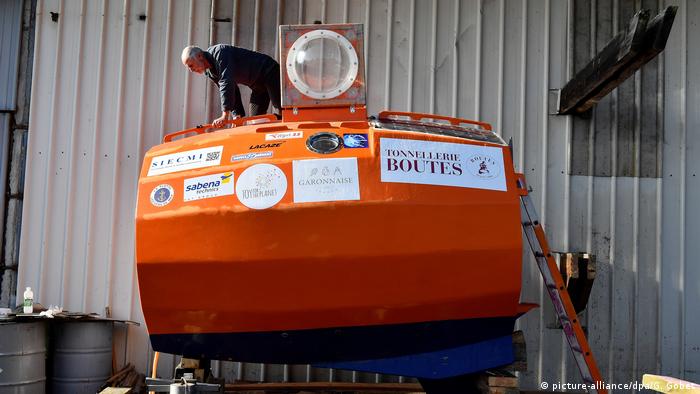A 71-year-old Frenchman has set sail across the Atlantic Ocean in a large orange barrel.
He hopes to float to the Caribbean by the end of March -- and you can track his journey online.
法國老人乘木桶橫渡大西洋探險
法國退休老人、探險家讓-雅克·薩文決定使用特殊交通工具——一個膠合板木桶橫渡大西洋。在探險過程中, 這位法國老人自己也成了科研試驗的對象。
(德國之聲中文網)橙色的膠合板木桶長3米,寬2.1米。內部設有睡眠區、休息區、廚具、茶几和一些存儲空間。探險家薩文(Jean-Jacques Savin)可以通過地板上的一個透明孔觀看海中的魚。
現年71歲的這位法國退休老人希望在接下來的三個月裡獨自在這個膠合板木桶中度過。這位昔日的飛行員和跳傘運動員為這次旅行做了幾個月的準備工作。他計劃在三個月後到達加勒比海。"盲目"的旅行
週三(12月26日), 他從西班牙加那利群島的耶羅島( el hierro )起航。起航後他在電話中說:"天氣很好"。"我遇到了1米高的海浪,並以每小時2到3公里的速度前進"。他乘坐的表層塗了合成樹脂的膠合板木桶將完全借助海浪和風力漂往目的地。不過,薩文並不知道他會在哪裡登陸。他說:"也許在巴巴多斯, 但我認為在一個法國島嶼, 如馬提尼克島或瓜德羅普島可能手續上更簡單一些。"
薩文將帆船運動員邦巴德(Alain Bombard)視為楷模。1952年, 邦巴德乘坐一艘小橡皮艇橫渡大西洋。沒有食物,他就以浮游生物和壓碎的魚為食。據法國廣播公司的報導, 薩文為這次旅行帶了幾升葡萄酒,為的是研究酒精在海上如何老化。不過,為慶祝除夕和一月份的72歲生日,薩文還額外攜帶了一瓶紅葡萄酒和一瓶白葡萄酒。

聖誕節第二天, 他從西班牙加那利群島的耶羅島( el hierro )起航
退休老人成試驗對象
薩文還想利用漫長的漂流過程為科學做貢獻: 他為一家研究所帶上了一個測量水流的浮標, 並將自己作為在狹小空間內長時間逗留的孤獨試驗對象。
通過衛星定位系統,人們可以在互聯網上隨時跟踪關注這位冒險家的旅程。
李京慧/凝煉(法新社、德新社)




